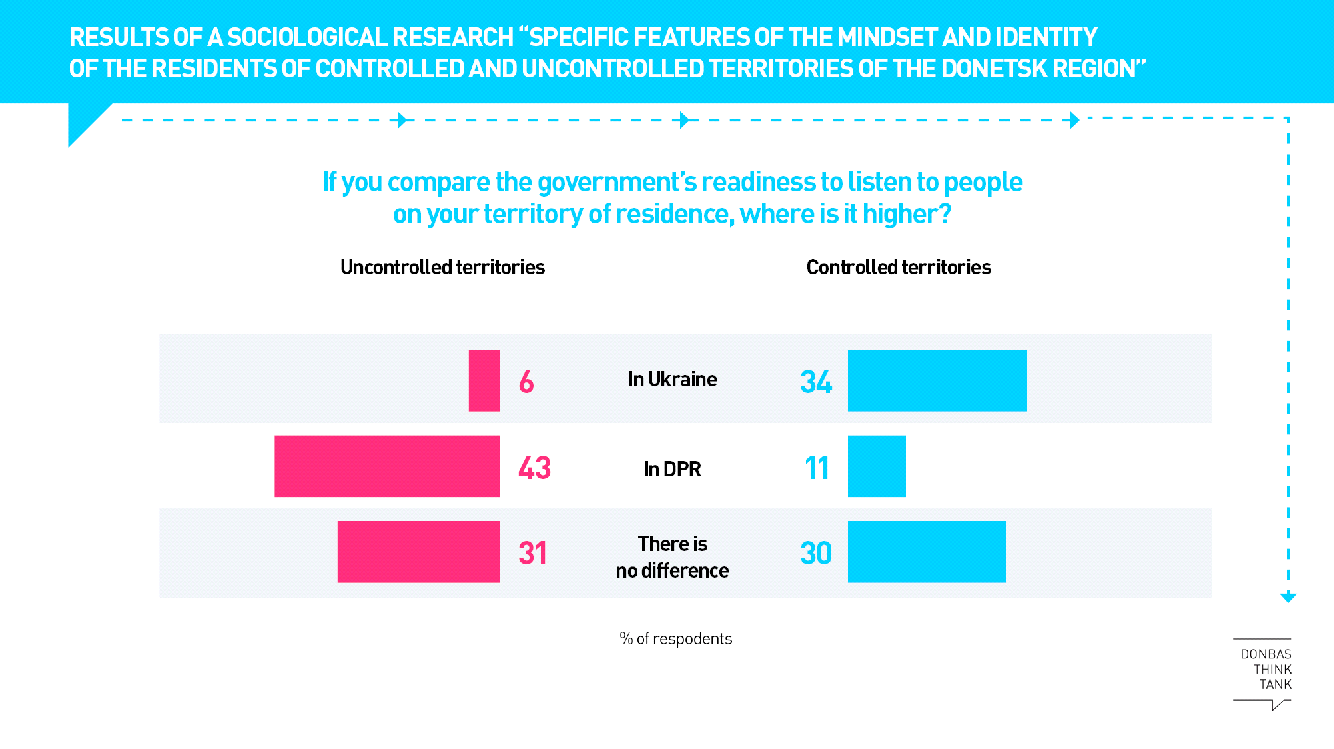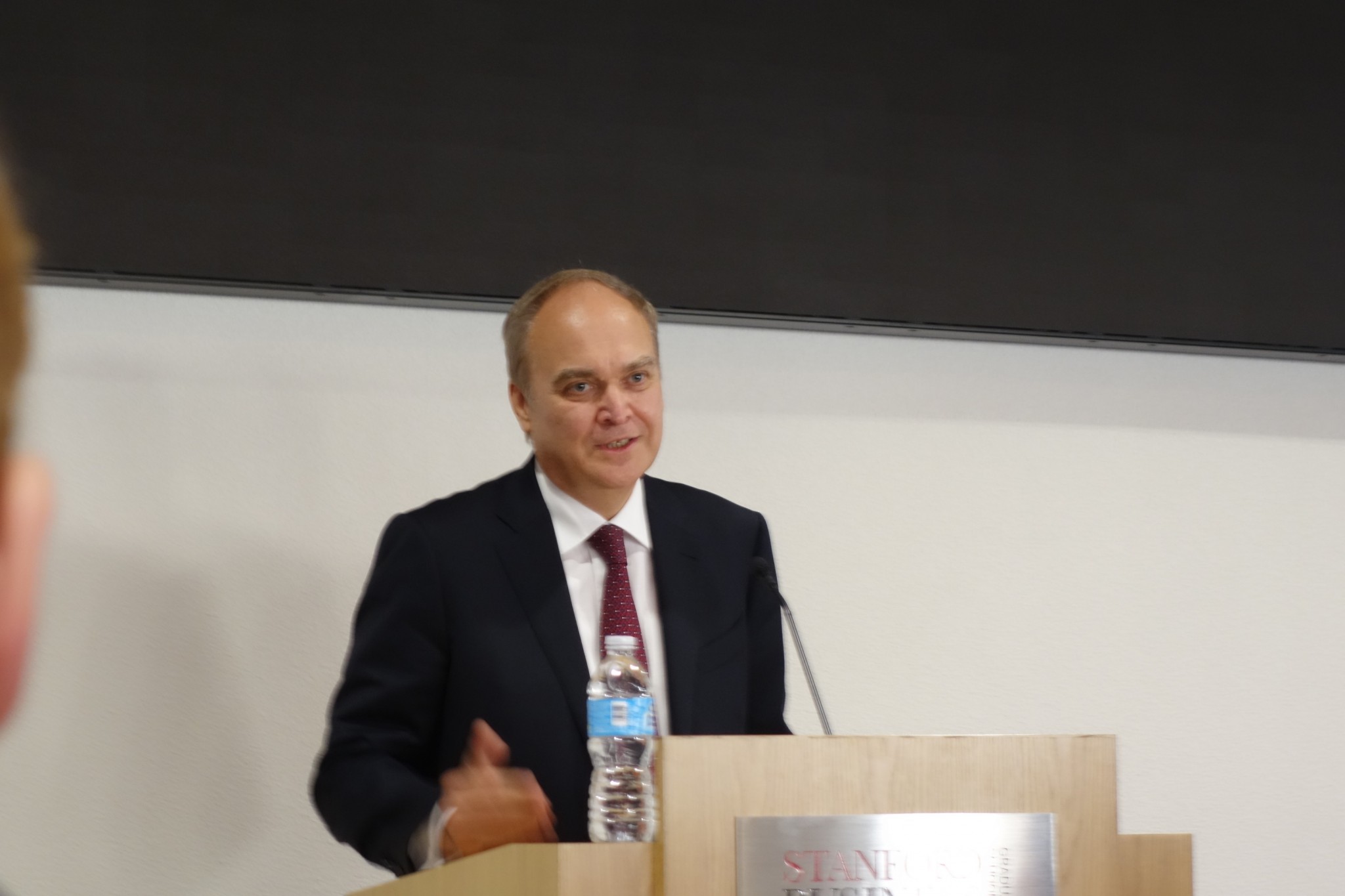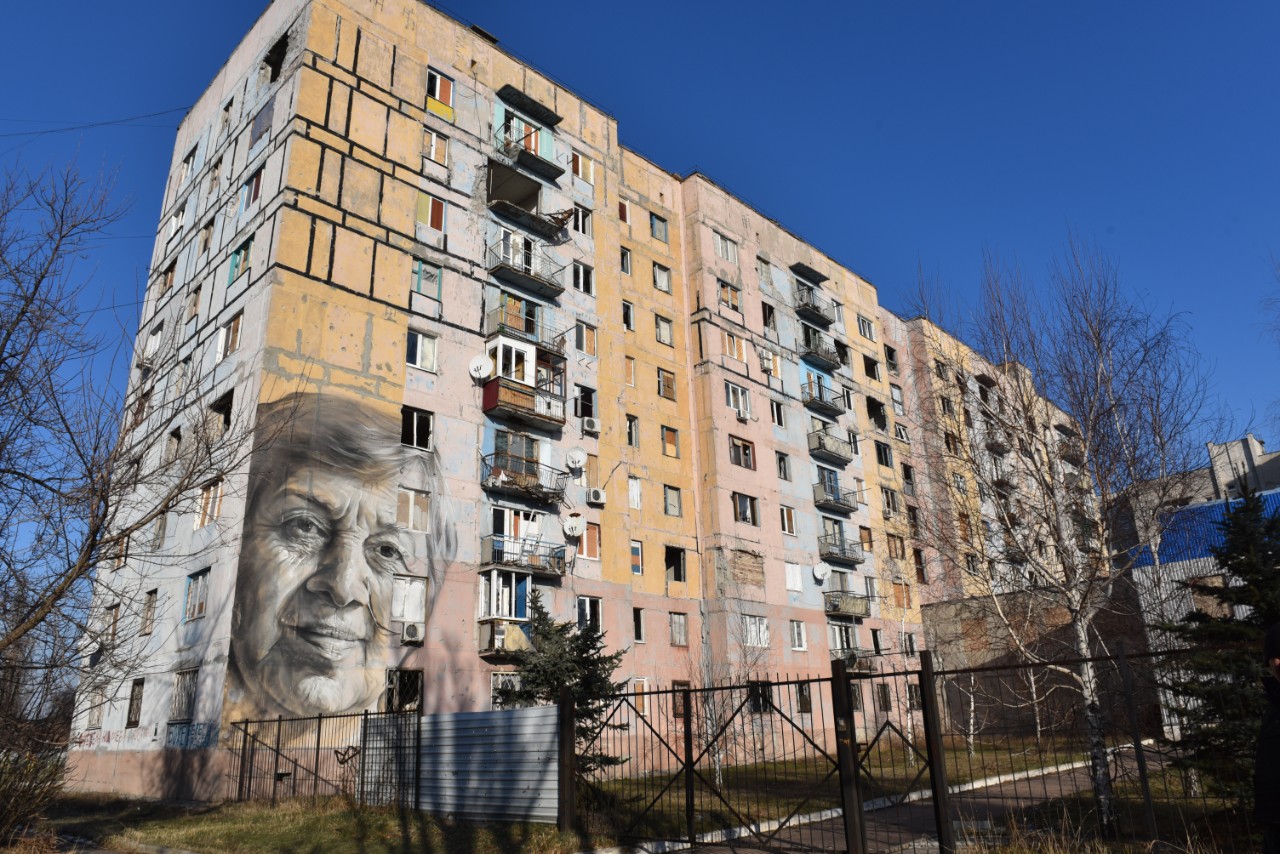A new survey finds only small fraction of "DNR" residents identifying themselves as a "DNR" citizen. However, this number is prone to grow. Ukraine has 3-5 years to prevent an irreversible rift between people living in uncontrolled territories.
A new Ukrainian analytical center, Donbas Think Tank, has published a survey conducted among the residents of the Donetsk Oblast (Region) living on territories controlled by the Ukrainian government and occupied territories, controlled by the unrecognized "Donetsk People's Republic" (DNR). The initiators of the survey note that this the first complex comparative study of the attitudes of Donetsk Oblast residents on both territories both controlled and uncontrolled by the government.

So far, a single entity
The survey shows that so far, residents on both sides of the front constitute a single socio-cultural entity. Its features are a strong territorial Donbas identity and feeling of belonging to the place of residence (60% on government-controlled, 61% on "DNR" territories), a need of protection by a "strong state" and a "strong leader," and the importance of economic and cultural ties with Russia.
According to Dmytro Tkachenko, head of the Donbas Think Tank, this means that Donbas remains a paternalistic region whose residents are ready to take up full resposibility for their lives and their city and need protection from a 'strong state.' However, he notes, this is a feature shared with other regions of Ukraine.
Mr.Tkachenko notes that this is only natural for a society living in a closed information space under the heavy influence of propaganda, in which the occupation regime carries the monopoly to the truth. "This number also means that Russian propaganda in the XXI century is quite effective. People on the occupied territories see only one 'picture,' which is presented by the "DNR" and Russian media, and in result end up living in a parallel reality," he asserts.
"As soon as Ukrainian authorities restore control over these territories, the situation will restore quickly. But if we do nothing, this identity is likely to grow," Serhiy Hovorukha, the director of the Ukrainian office of the international research agency IFAK Institut told BBC.
And in 3-5 years, Ukraine risks "losing" the people living in the occupied territories, the authors of the survey conclude.
Today, a tendency of increasing distance between the residents of the uncontrolled territory and Ukrainian state, feeling of distance among the residents of the uncontrolled area (compared with the residents of the controlled territory) towards the residents of other regions of Ukraine, and a relatively strong feeling of socio-cultural otherness among the residents of the uncontrolled area (compared with the residents of the controlled area) which implies the feeling of their dissimilarity with the residents of Ukraine and Russia, are the harbingers of a rift in identity of Ukrainians living in territories uncotrolled by the government, which is all too likely to grow with time.
"These numbers were received on reliable samples - everything like in peaceful times," emphasized Serhiy Hovorukha. He added that international sociological associations don't recommend making surveys only during escalations of military conflicts, and the researchers did not collaborate with the self-proclaimed "authorities" of the "DNR" while making the survey on its territory.
With whom do they have more in common: with residents of Ukraine or Russia?
35% of respondents on Ukrainian-controlled territory believe that their values and way of thinking are significantly different from Russia’s residents and are similar to the residents of other regions of Ukraine; only 9% of respondents on the "DNR"-controlled area agreed with this statement, but 42% said they were more similar to Russians. In government-controlled areas, 20% see themselves similar to Russians.
31% of "DNR" respondents said they were different from both residents of other Ukrainian regions and Russians; on the other side of the front, the number is only 16%.
Crisis or war? Federation or unitary system?
Unsurprisingly, more residents of "DNR"-controlled Donetsk Oblast see the conflict in Donbas as a civil war and less - as a war with Russia than those of Ukrainian-controlled territories, mirroring the Russian narrative. In the Ukrainian-controlled territories, the version of a "political crisis" dominates.
Similar fractions would prefer that Ukraine not join any political or economic unions (38% in Ukrainian-controlled territory and 30% in "DNR"-controlled territory). However, while the former are split between entering a union with the EU and Russia (slightly over 20%), overwhelmingly more wish to join a union with Russia than with the EU in occupied regions (48% versus 9%).
Although more residents on both sides of the front would prefer Ukraine to be a federation than the current unitary system, the numbers differ greatly: 46% versus 38% in Ukrainian-controlled localities, and 68% versus 15% in occupied regions.
Where is life better?
The residents of the controlled area are aware that in regards economic (welfare, employment opportunities and price rates) and political (observance of human rights and freedoms, government’s readiness to listen to the people) living conditions in Ukraine are better than “DNR”.
"Level of anxiety"
The most pronounced emotion among residents of both areas is anxiety (51% on the Ukrainian-controlled and 41% on the uncontrolled territory) and fatigue (37% on the controlled and 35% on the uncontrolled territory). The most pronounced fear is related to personal security - people are afraid of hostilities on the territory of their residence increasing (78% on uncontrolled and 73% on controlled territory).
Other dominant emotions among the residents of the controlled territory is disappointment (37%) and anger (30%).While negative emotions prevail among the residents of the controlled area of the Donetsk Oblast, a large part of the inhabitants of the uncontrolled territory have such positive emotions as hope (37%) and cohesion and solidarity (31%).
At the same time, 23% of respondents in Ukrainian-controlled territories fear of Ukraine’s demise and the formation of several states on its territory, reflecting their lack of confidence in Ukraine’s integrity and strength.
What should be done?
The Donbas Think Tank researchers emphasize: measures should be taken now to avoid losing the hearts of people living in temporarily occupied territories. They advise neutralizing the Donetsk TV tower broadcasting "DNR"-controlled media and/or constructing a TV tower on government-controlled territories that would carry equal broadcasting power. Simplifying rules of crossing checkpoints would enhance connectivity between the parts of the Oblast on both sides of the front.
But, what is even more important, a strategy of reintegrating Donbas should be developed and communicated. As no strategy exists so far, it is not suprising that nothing is being communicated, and Donbas is drifting away.
[hr]
The survey was conducted for Donbas Think Tank by the Ukrainian office of the international research agency IFAK Institut from May 30 to June 13 2016 by using the method of face-to-face interview. The sample of respondents on the uncontrolled territory of the Donetsk region was 605 and 805 respondents on the controlled territory. The sampling error on the uncontrolled territory was 3, 98% and 3, 45% on the controlled territory.
The survey was conducted with the support of National Endowment for Democracy and the International Renaissance Foundation. The full report in Ukrainian is available here and a translation is here.




















